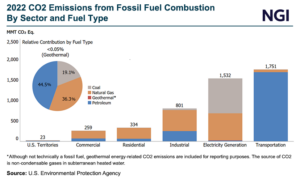Regulatory | NGI All News Access
Cabinet Changes in Mexico Bring Hope for Improving Investment Conditions
© 2024 Natural Gas Intelligence. All rights reserved.
ISSN © 2577-9877 | ISSN © 2577-9966 |

Energy Transition
Creating credible, transparent emissions profiles to differentiate natural gas supply has come a long way from the “responsibly sourced” days, as decarbonization as a service, or DaaS, moves beyond a nice-to-have for operators to a must-have to gain customers, according to experts. Natural gas heavies EQT Corp. and Williams have been at the forefront of…
April 23, 2024Energy Transition
By submitting my information, I agree to the Privacy Policy, Terms of Service and to receive offers and promotions from NGI.